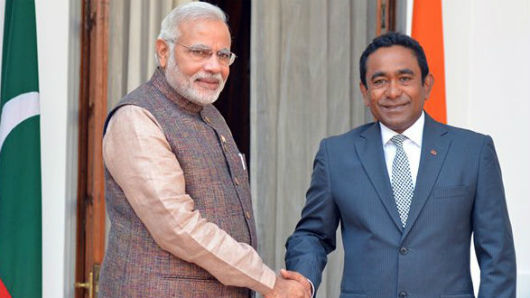In letter to Modi, Yameen pledges to keep Indian Ocean demilitarized
President Abdulla Yameen, in a letter to Indian Prime Minister Narendra Modi, has assured India that Maldives will keep the Indian Ocean demilitarized and will not allow foreign military bases in the Maldives, report Indian media.

09 Aug 2015, 09:00
President Abdulla Yameen, in a letter to Indian Prime Minister Narendra Modi, has assured India that Maldives will keep the Indian Ocean demilitarized and will not allow foreign military bases in the Maldives, report Indian media.
The Maldivian government has declined to comment on the content of the letter, but the foreign ministry confirmed that the Maldivian foreign secretary Dr. Ali Naseer Mohamed handed Yameen’s letter to Modi to the Minister of External Affairs of India Smt. Sushma Swaraj on Saturday.
The letter follows an unprecedented constitutional amendment that allows foreigners to own land in the Maldives for the first time. The opposition had raised fears of Chinese military expansion in the Maldives with the amendment, but both the government and China have dismissed the claims.
Since the passing of the amendment, Indian Foreign Secretary Dr. S. Jaishankar visited the Maldives on August 4 and met with the Vice President Ahmed Adeeb and discussed the strengthening of bilateral ties.
Become a member
Get full access to our archive and personalise your experience.
Already a member?
Discussion
No comments yet. Be the first to share your thoughts!
No comments yet. Be the first to join the conversation!
Join the Conversation
Sign in to share your thoughts under an alias and take part in the discussion. Independent journalism thrives on open, respectful debate — your voice matters.




